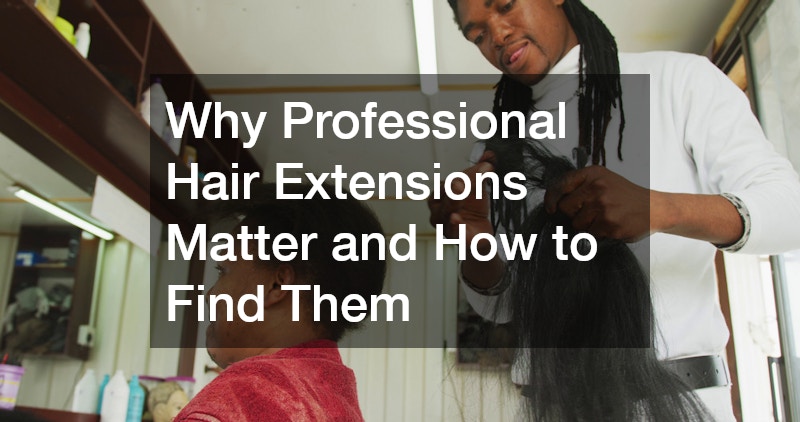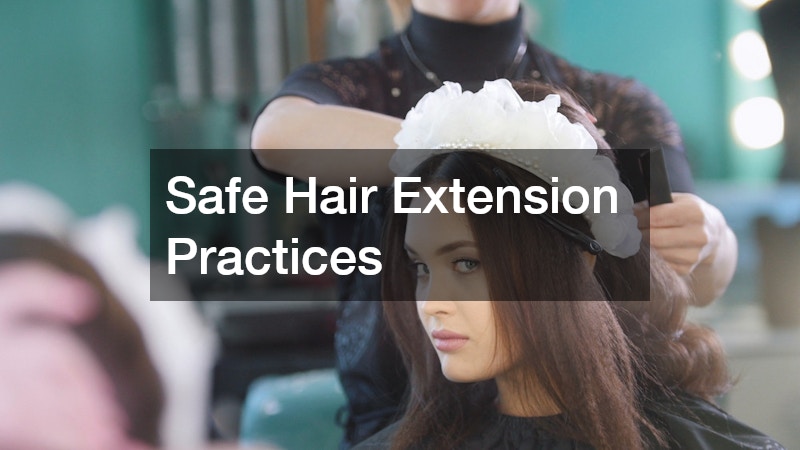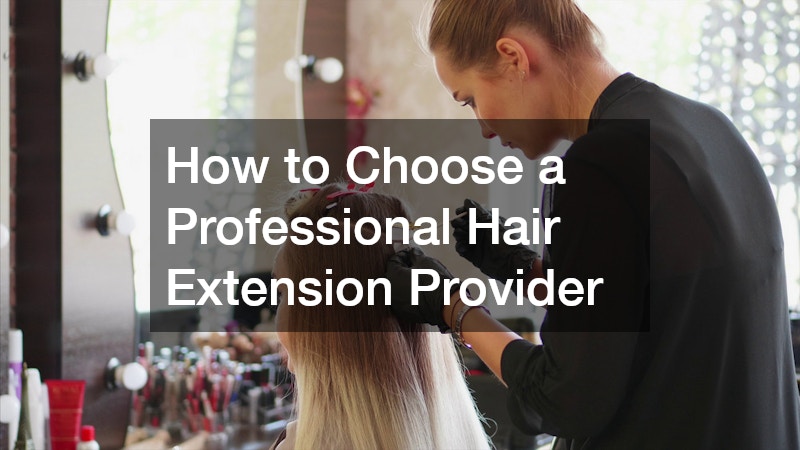- Choose a licensed, trained, and experienced hair extension provider to ensure safety and professional results.
- Understand the different types and materials of extensions to select the best option for your hair goals.
- Ask key questions about quality, ethical sourcing, maintenance, and longevity before booking.
- Follow professional guidance for pre-application, application, and aftercare to protect your hair.
- Maintain holistic hair health through nutrition, scalp care, and regular salon check-ups.
- Avoid providers with red flags, such as unlicensed stylists, extremely low prices, or poor reviews.
- Invest in trusted brands and salons to achieve natural-looking, long-lasting, and damage-free extensions.
Why Professional Hair Extensions Matter and How to Find Them

Hair extensions have become one of the most popular beauty enhancements, with an estimated $3.2 billion market in the U.S. alone in 2024, and the trend continues to grow globally. Millions of people are turning to extensions to add volume, length, or a touch of glamour, whether for special events, social media looks, or everyday confidence. The allure of instantly transforming your hairstyle is undeniable—but it comes with risks if you don’t choose the right professional. Poorly applied extensions can lead to hair damage, scalp irritation, and results that are difficult to reverse.
So, how do you know who offers professional extensions and which providers you can trust? Choosing a professional hair extension provider ensures your hair remains healthy, your extensions blend naturally, and the results are stunning and long-lasting. Professionals follow safe application techniques, use high-quality, ethically sourced hair, and provide guidance on maintenance—all of which contribute to a beautiful, damage-free outcome.
In this comprehensive guide, we’ll explore who offers professional extensions, what to look for in a provider, and practical tips for maintaining your extensions. By the end, you’ll have the knowledge to confidently select a trusted professional, protect your hair, and enjoy gorgeous, seamless extensions that elevate your look while keeping your hair healthy.
Understanding Hair Extensions
Before diving into how to select a professional provider, it’s essential to understand the types of hair extensions and the materials used. Knowing your options helps you make informed decisions aligned with your hair goals and health.
Types of Hair Extensions
Hair extensions come in a variety of forms, each suited for different needs, hair types, and lifestyles:
-
Clip-In Extensions
-
Temporary and easy to apply at home.
-
Ideal for adding volume or length for a single day or event.
-
Low risk of damage if used correctly.
-
-
Tape-In Extensions
-
Semi-permanent and applied using adhesive tape.
-
Can last 6–8 weeks with proper care.
-
Lightweight and natural-looking, but require a trained professional for best results.
-
-
Sew-In or Weave Extensions
-
Hair is braided into natural hair and sewn with thread.
-
Suitable for thicker hair types.
-
Requires maintenance to avoid tension-related hair loss.
-
-
Keratin or Fusion Extensions
-
Bonded with keratin tips using heat.
-
Can last several months with proper care.
-
Best applied by trained professionals to prevent scalp burns or breakage.
-
-
Microbead or I-Tip Extensions
-
Individual strands are attached using small beads.
-
Non-adhesive and reusable, ideal for those avoiding heat or glue.
-
Proper installation prevents tugging and breakage.
-
-
Halo Extensions
-
A single weft sits on top of the head using an invisible wire.
-
Instant length and volume without glue or heat.
-
Safe for hair when used occasionally.
-
Materials Used
-
Human Hair Extensions
-
Most natural-looking and versatile for styling.
-
Can be colored, curled, or straightened like your natural hair.
-
Ethical sourcing is crucial to ensure the hair is not taken under exploitative conditions.
-
-
Synthetic Hair Extensions
-
Typically cheaper and pre-styled.
-
Cannot be heat-styled and often appear less natural.
-
Shorter lifespan and prone to tangling.
-
Understanding these factors allows you to have a more informed conversation with your stylist and ensures the final look is safe, healthy, and aligned with your personal style.
Why Choosing a Professional Provider Matters
The quality of your hair extensions largely depends on the skill and experience of the provider. While DIY kits may seem convenient, there are several compelling reasons to choose a professional:
-
Hair Health Protection
-
Unprofessional application can cause breakage, thinning, and even permanent hair loss.
-
Professionals ensure proper tension and placement to protect your natural hair.
-
-
Long-Lasting, Natural Results
-
A skilled stylist can match textures, shades, and lengths for seamless blending.
-
Professional products last longer and maintain their look and shine.
-
-
Safety and Hygiene
-
Trained providers follow sanitation protocols, reducing the risk of scalp infections.
-
Heat, glue, or bead application is done with precision to avoid burns or irritation.
-
Choosing a professional not only protects your hair but also guarantees results that boost your confidence and maintain your hair’s overall health.
Credentials to Look For in a Hair Extension Provider
Finding the right provider is more than just checking their Instagram portfolio. The following credentials help ensure safety, quality, and professional expertise:
Certification and Training
-
Look for stylists licensed in cosmetology or hairdressing.
-
Specialized training in hair extension application techniques.
-
Membership in professional hair extension organizations or industry associations.
Experience and Portfolio
-
Request to see before-and-after photos of previous clients.
-
Ask about their experience with the specific type of extensions you want.
-
Experience with different hair types and textures ensures adaptability and personalized results.
Reputation and Reviews
-
Check online reviews on Google, Yelp, or social media platforms.
-
Word-of-mouth recommendations from friends or family.
-
Consistent positive feedback over time is a strong indicator of reliability and skill.
Questions to Ask Before Booking an Appointment
Asking the right questions ensures transparency and helps avoid unpleasant surprises. Some essential questions include:
-
How long will the extensions last, and what maintenance do they require?
-
Are the extensions ethically sourced and high-quality?
-
Can you see a portfolio of previous clients with similar hair types?
-
What is the total cost, including installation, maintenance, and removal?
-
Do you offer guidance on daily care and styling?
Having these answers in advance sets realistic expectations and builds trust with your provider.
Safe Hair Extension Practices

Maintaining healthy hair while enjoying extensions requires both professional application and proper care routines.
Pre-Application Hair Care
-
Strengthen your hair with deep conditioning treatments.
-
Trim split ends to prevent further damage during installation.
-
Avoid chemical treatments immediately before applying extensions.
Application Process Safety
-
Ensure even sectioning to reduce strain on natural hair.
-
Avoid excessive tension that may cause hair breakage or scalp pain.
-
Confirm that all tools and equipment are sanitized.
Post-Application Hair Care
-
Use sulfate-free shampoos and conditioners to protect the bonds.
-
Brush gently with a soft-bristle extension brush.
-
Avoid excessive heat or chemical treatments that may weaken bonds.
-
Schedule regular maintenance visits to prevent matting or slippage.
Proper care ensures that your extensions not only look stunning but also support the long-term health of your natural hair.
Maintaining Healthy Hair with Extensions
Keeping your hair and extensions in top condition requires both proactive care and holistic health practices:
-
Regular Salon Check-Ups
-
Extensions need adjustments every 6–8 weeks depending on type.
-
Professionals remove damaged strands and reapply as needed.
-
-
Preventing Breakage and Tangling
-
Sleep with a silk or satin pillowcase to reduce friction.
-
Tie hair in a loose braid or ponytail to prevent tangling.
-
-
Holistic Hair Health
-
Proper nutrition: protein, vitamins (especially Biotin, Vitamin D, Iron), and hydration.
-
Scalp massages to improve circulation and hair growth.
-
Manage stress, as chronic stress can weaken hair and reduce its resilience.
-
Combining salon care with holistic health habits ensures long-lasting, beautiful, and healthy hair.
Red Flags to Avoid When Choosing a Provider
Not all hair extension providers maintain the same standards. Watch out for these red flags:
-
Providers without proper licensing or certification.
-
Extremely low prices that may compromise quality or safety.
-
Lack of transparency regarding the type or source of hair used.
-
Inadequate portfolio or poor-quality before-and-after examples.
-
Stylists who pressure you into unnecessary treatments or upsells.
Avoiding these pitfalls protects your hair from potential damage and ensures a positive extension experience.
Benefits of Choosing a Professional Provider
Opting for a trained, professional provider offers numerous advantages:
-
Long-Lasting Results – Extensions applied correctly last longer without damage.
-
Natural Look – Professionals blend the extensions seamlessly with your hair.
-
Hair Health Protection – Proper installation techniques minimize damage.
-
Confidence – Knowing your stylist is qualified allows you to enjoy your new look stress-free.
The peace of mind and beauty results are worth investing in a professional service rather than risking DIY or inexperienced providers.
Popular and Trusted Hair Extension Brands and Salons
Choosing reputable brands and salons further ensures a safe and high-quality experience. Some trusted options include:
-
Brands:
-
Great Lengths, Balmain, Bellami, Luxy Hair – known for high-quality human hair extensions.
-
-
Salons:
-
Check local certified salons with verified client reviews and portfolios.
-
Look for specialists who are trained in multiple extension techniques.
-
When in doubt, verify the authenticity of products and the credentials of the salon before booking an appointment.
Conclusion
Hair extensions are an incredible tool for enhancing your beauty, boosting confidence, and completely transforming your style. From adding instant volume to experimenting with new lengths and colors, extensions allow you to achieve looks that might not be possible with your natural hair alone. However, achieving safe and stunning results requires careful consideration and the selection of a professional hair extension provider. Choosing the right stylist is not just about aesthetics—it’s about protecting the long-term health of your natural hair.
Key Takeaways:
-
Understand the types and materials of extensions before choosing a provider. Knowing whether you want clip-in, tape-in, keratin, or sew-in extensions—and whether they are human or synthetic hair—will help guide your choice. For more details on extension types and their effects on hair, you can refer to Allure’s expert guide on hair extensions.
-
Prioritize licensed, trained, and experienced stylists. Professionals with proper training minimize risks like breakage, scalp irritation, or uneven results. Check for certifications, portfolios, and years of experience to ensure competence.
-
Ask the right questions to ensure quality, safety, and ethical sourcing. Make sure the provider is transparent about where their hair comes from and how it is treated. Ethical sourcing not only supports global standards but also ensures healthier, longer-lasting extensions.
-
Follow professional guidance for pre-application, application, and post-care. Proper preparation and aftercare, including gentle brushing, sulfate-free shampoos, and regular maintenance visits, are essential for preserving the look and integrity of your extensions.
-
Maintain holistic hair health through nutrition, scalp care, and regular salon visits. Hair health starts from within—balanced nutrition, proper hydration, and scalp stimulation all contribute to stronger, more resilient hair. The American Academy of Dermatology provides excellent tips on maintaining hair and scalp health alongside cosmetic treatments.
-
Avoid providers with red flags, such as unlicensed stylists, extremely low prices, or poor client reviews. Choose trusted brands and salons with proven reputations to ensure both quality and safety.
Investing time in researching and selecting a professional hair extension provider guarantees that your extensions not only look beautiful but also support the long-term health of your natural hair. With the right approach, safe application techniques, and proper maintenance, you can enjoy gorgeous, natural-looking, and long-lasting results that enhance your beauty, confidence, and overall hair wellness. Hair extensions should be an empowering addition to your style—not a source of hair damage or frustration—and working with a trusted professional ensures that every strand is cared for.
FAQ
Q1: How long do hair extensions last?
-
Depending on type, quality, and care, extensions can last from a few weeks to several months.
Q2: Can I style extensions with heat tools?
-
Human hair extensions can usually be styled with heat. Always use a heat protectant. Synthetic extensions often cannot be heat-styled.
Q3: Do extensions damage natural hair?
-
Extensions are safe when applied by trained professionals. Improper installation or poor care can cause damage.
Q4: How do I maintain extensions between salon visits?
-
Use gentle brushes, sulfate-free shampoos, and follow stylist-recommended care routines.
Q5: Are all hair extensions ethically sourced?
-
Only some brands guarantee ethical sourcing. Ask your provider and choose reputable brands



